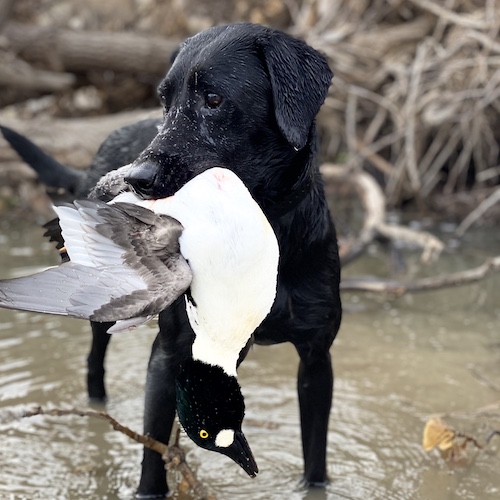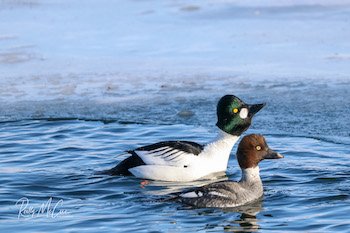Common Goldeneye
 Common Goldeneye (Bucephala clangula) has a seemingly large head for its body according to its genus. Distinct characteristics for common goldeneye drakes include iridescent green heads, bright-white circular cheek patches, and piercing yellow irises. Common goldeneye drakes have short, black bills. Necks, wings, and underbellies are white. Both sexes display bright orange legs. Females display chocolate brown plumage on the head, and have whitish neck, breast, and belly much like that of the drake. In flight, common goldeneye drake have dark wings with prominent, unbroken white wing patch formed by secondaries and secondary coverts. Common goldeneye hens also have short bills, more gray than black, that will have a yellow tip appearing in spring. This differs from the bill of the Barrow’s Goldeneye hen bills that will turn completely yellow. Both sexes have similar black and white wings; drakes display white on the secondaries and coverts while hens have more scattered white. Common goldeneyes are fast fliers, their wings whistling, often heard before seen. Common goldeneye flocks are usually small and compact.
Common Goldeneye (Bucephala clangula) has a seemingly large head for its body according to its genus. Distinct characteristics for common goldeneye drakes include iridescent green heads, bright-white circular cheek patches, and piercing yellow irises. Common goldeneye drakes have short, black bills. Necks, wings, and underbellies are white. Both sexes display bright orange legs. Females display chocolate brown plumage on the head, and have whitish neck, breast, and belly much like that of the drake. In flight, common goldeneye drake have dark wings with prominent, unbroken white wing patch formed by secondaries and secondary coverts. Common goldeneye hens also have short bills, more gray than black, that will have a yellow tip appearing in spring. This differs from the bill of the Barrow’s Goldeneye hen bills that will turn completely yellow. Both sexes have similar black and white wings; drakes display white on the secondaries and coverts while hens have more scattered white. Common goldeneyes are fast fliers, their wings whistling, often heard before seen. Common goldeneye flocks are usually small and compact.
Available Hunts
-
Nebraska Waterfowl Hunts
Great Nebraska waterfowl hunting. SIXTEEN MILES of fabled North Platte River duck hunting area on nearly 400,000 acres associated properties under exclusive wraps. Expect some of North America's very best mallard and big Canada goose hunting.
...read more- Mallards and big Canada geese. LOTS of them. Central Flyway limits of 6 ducks (5 mallards) and 5 honkers daily
- North Platte River, adjacent agriculture, miles of hot-springs sloughs that never freeze
- Comfortable lodging, excellent meals, professional guide services, heated pits
- Accommodates 3-6 waterfowl hunting guests
- Located 3.5 hours from Denver airport; only 45 minutes from Scottsbluff, Nebraska
Rate: $2,500-$3,500 packages -
New England Sea Duck Hunting
World renown for its eider hunting, New England waterfowling offers an incredible change of scenery and is an excellent place to check off lots of North America waterfowl species. Codfather Charters specializes in making your hunt priorities a reality.
...read more- Decade-plus experience for trophy eiders, other sea ducks, divers, dabblers, mergansers, geese
- Best place in US to harvest prime American black ducks
- Customized hunt plans reflect hunter priorities, not a “one size fits all” type 1/2-day hunt
- Includes hotel accommodations, full-day hunting, continental breakfasts, made-to-order lunches
- Recognized as foremost among US waterfowl collectors and taxidermists
- Nearby non-hunting spouse activities abound
Rate: $2,500 for 3-day inclusive package -
Russia Capercaillie Hunt
Russia bird hunting takes place during late-April to May, targets capercaillie and black grouse, and may include opportunities for trophy Eurasian waterfowl species and more.
...read moreRussia capercaillie and duck hunting takes place in some of the most remote, unspoiled backcountry in the world of wingshooting. The boreal forests of northern Russia boasts the world’s greatest densities of Capercaillie and Black Grouse. Duck hunting in Russia during the spring season, when breeding plumage is optimal, coincides with grouse courting seasons, when leks are teaming with strutting grouse, making this Russian bird hunting experience the ideal off-the-beaten path adventure for collecting some of the world’s most coveted Old World grouse and waterfowl species.
Rate: NFS -
Wyoming Duck Hunt
Wyoming duck hunt at Mountain View Mallards entails plentiful mallards and Canada geese in one of the most stunningly beautiful parts of America. Hunt comfortably from heated blinds and enjoy the show.
...read more- Predominately mallards and Canada geese, other species seasonally
- Upscale, newly constructed 6-bedroom lodge, with excellent amenities
- 3 excellent chef-prepared meals daily, dinner feature beef
- December-January primetime
- Comfortable heated blinds, professional guide-staff
- For 2-6 hunters, maximum 12 guests
- Fly into Billings MT or Cody WY
Rate: $2,750 3-day package
 Common goldeneyes are found across the northern hemisphere with several races acknowledged. In North America they find suitable breeding grounds in boreal forests throughout Alaska and Canada. They will nest in the cavities of live or dead trees or manmade nest boxes rather than on the ground. Older pairs will often return to the same nesting sites year after year, sometimes claiming pileated woodpecker cavities as their own. For visibility, this species prefers shallow lakes, rivers, and wetlands with little vegetation.
Common goldeneyes are found across the northern hemisphere with several races acknowledged. In North America they find suitable breeding grounds in boreal forests throughout Alaska and Canada. They will nest in the cavities of live or dead trees or manmade nest boxes rather than on the ground. Older pairs will often return to the same nesting sites year after year, sometimes claiming pileated woodpecker cavities as their own. For visibility, this species prefers shallow lakes, rivers, and wetlands with little vegetation.
Plants do not make up a significant portion of their diet. They prefer crabs, shrimp, fish (and fish eggs), barnacles, and insects; will eat seeds and tubers of plants when animal matter is not available. Common Goldeneyes frequently synchronize their diving while foraging. This species is fairly aggressive, usually out-competing most other ducks when defending nesting and foraging territories. They will reside year-round in southwestern Canada and in the northeast United States. Wintering grounds include every state in the U.S. and Mexico, favoring the coasts.
Drakes can be distinguished from Barrow’s goldeneyes. Look for smaller body size, less bulbous head shape, iridescent green head, circular check patch, un-barred white wing patch in flight and while swimming.







